

Should humanity be worried about the rise of intelligent machines? Jordan Peele uses AI, President Obama in fake news PSA. Intelligent machines will replace teachers within 10 years, leading public school headteacher predicts. Inspirational teachers of the future will be intelligent machines rather than humans, the influential head of one of Britain's most famous public schools predicts. Within 10 years a technological revolution will sweep aside old notions of education and change the world forever, Sir Anthony Sheldon, master of Wellington College believes. School teachers will lose their traditional role and effectively become little more than classroom assistants. They will remain on hand to set up equipment, help children when necessary and maintain discipline, Sir Anthony said.
However, the essential job of instilling knowledge into young minds will wholly be done by artificially intelligent (AI) computers. Sir Anthony, a historian and political commentator who has written biographies of ex-prime ministers David Cameron, Tony Blair, John Major and Gordon Brown, said: “It certainly will change human life as we know it. Isaac asimov - robots 2 - rur et dr frankenstein. Les légendes sont peu à peu dépassées, oubliées, au profit de récits plus proche de l'actualité de l'époque concernée.
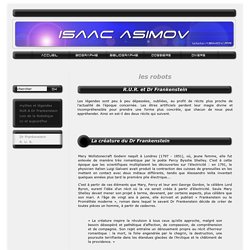
Les êtres artificiels perdent leur magie divine et incompréhensible pour prendre une forme plus concrète, que chacun de nous peut appréhender. Ainsi en est-il des deux récits qui suivent. Our future with robots. Corrigé compréhension Document 1 1 1.
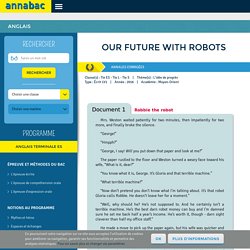
The characters present are Mrs. L'intelligence artificielle commence à faire parler les morts. Could artificial intelligence replace doctors? How artificial intelligence is transforming tennis. Can we trust AI if we don't know how it works? Image copyright Getty Images We're at an unprecedented point in human history where artificially intelligent machines could soon be making decisions that affect many aspects of our lives.
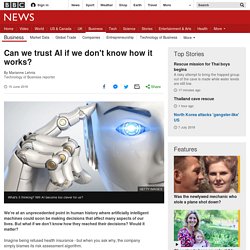
But what if we don't know how they reached their decisions? Would it matter? Imagine being refused health insurance - but when you ask why, the company simply blames its risk assessment algorithm. Or if you apply for a mortgage and are refused, but the bank can't tell you exactly why. Google bans AI for weapon use.
Image copyright Getty Images.
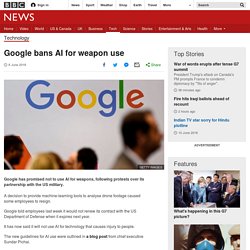
Are you scared yet? Meet Norman, the psychopathic AI. Image copyright MIT.
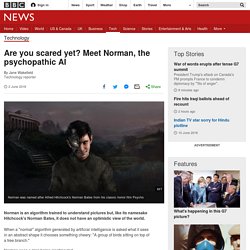
20 Minutes. « Bonjour, je voudrais prendre rendez-vous pour une coupe de cheveux pour femmes… » La conversation entre l'ordinateur et l'employée du salon de coiffure est bluffante.

A l'autre bout du fil, l'humaine ne soupçonne pas qu'elle parle à un robot. Avec la dernière version de son assistant vocal, présentée lors de sa conférence annuelle des développeurs en Californie (I/O 2018), Google démontre comment un humain peut interagir avec une machine en parlant normalement. Future - The dangers of trusting robots.
In February, a South Korean woman was sleeping on the floor when her robot vacuum ate her hair, forcing her to call for emergency help.
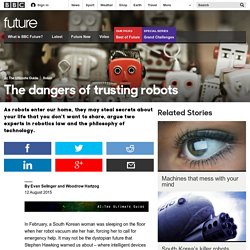
It may not be the dystopian future that Stephen Hawking warned us about – where intelligent devices “spell the end of the human race” – but it does highlight one of the unexpected dangers of inviting robots into our home. We are susceptible to telling our deepest, darkest secrets to anthropomorphic robots whose cute faces appear so innocent There are many other examples of intelligent technology gone bad, but more often than not they involve deception rather than physical danger. Malevolent bots, designed by criminals, are now ubiquitous on social media sites and elsewhere online. The mobile dating app Tinder, for example, has been frequently infiltrated by bots posing as real people that attempt to manipulate users into using their webcams or disclosing credit card information.
Most people guard their secrets in the presence of a recording device. Elon Musk and Stephen Hawking Among Hundreds to Urge Ban on Military Robots - The New York Times. Video and , along with hundreds of artificial intelligence researchers and experts, are calling for a worldwide ban on so-called autonomous weapons, warning that they could set off a revolution in weaponry comparable to gunpowder and nuclear arms.
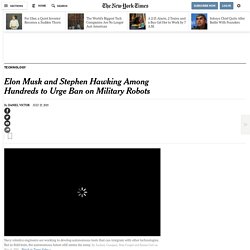
In a letter unveiled as researchers gathered at the International Joint Conference on Artificial Intelligence in Buenos Aires on Monday, the signatories argued that the deployment of robots capable of killing while untethered to human operators is “feasible within years, not decades.” If development is not cut off, it is only a matter of time before the weapons end up in the hands of terrorists and warlords, they said. Unlike drones, which require a person to remotely pilot the craft and make targeting decisions, the autonomous weapons would search for and engage targets on their own. Photo Mr. Why Elon Musk is worried about artificial intelligence. L’Intelligence Artificielle, au-delà des fantasmes - D.Views.
Alors que les premiers téléphones équipés de fonctions de machine learning ont été présentés par le fabricant chinois Huawei au dernier congrès mondial du mobile et qu’en décembre dernier Amazon a ouvert à Seattle la première grande surface sans caisse, nul ne peut plus nier l’évidence : l’intelligence artificielle (IA) est entrée dans une phase de développement sans précédent et s’impose dans notre quotidien à un rythme qui étonne, fascine et effraie aussi.
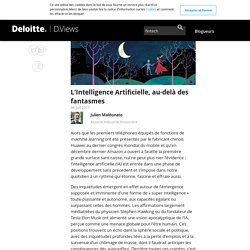
Des inquiétudes émergent en effet autour de l’émergence supposée et imminente d’une forme de « super intelligence » toute-puissante et autonome, aux capacités égalant ou surpassant celles des hommes. Les affirmations largement médiatisées du physicien Stephen Hawking ou du fondateur de Tesla Elon Musk ont alimenté une vision apocalyptique de l’IA, perçue comme une menace globale pour l’être humain.
C'est bot l'amour: «Le premier mariage entre un homme et un robot sera célébré dans le Massachusetts» Cet été, 20 Minutes s’intéresse à l’amour avec les robots.
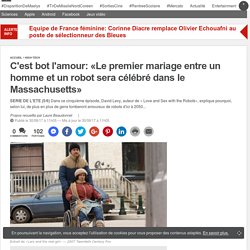
Pour cette série, nous avons rencontré des hommes, en France et au Japon, qui entretiennent une relation intime, amoureuse parfois, avec un personnage virtuel. Pour le cinquième des six épisodes, nous avons rencontré le prophète des relations hommes-machines. The Guardian view on robots as weapons: the human factor. The future is already here, said William Gibson. It’s just not evenly distributed. One area where this is obviously true is the field of lethal autonomous weapon systems, as they are known to specialists – killer robots to the rest of us. Such machines could roam a battlefield, on the ground or in the air, picking their own targets and then shredding them with cannon fire, or blowing them up with missiles, without any human intervention. Artificial intelligence will become strong and threaten us, says Bill Gates, as he details new AI-driven personal assistant. Artificial intelligence will start out as a help but will become “strong enough to be a concern”, Bill Gates has said in its latest question and answer session on Reddit.
In response to a question about whether machine super intelligence will become an existential threat, Gates said that he was “in the camp that is concerned about super intelligence”. “First the machines will do a lot of jobs for us and not be super intelligent,” he wrote. That should be positive if we manage it well. “A few decades after that though the intelligence is strong enough to be a concern. Artificial intelligence could kill us because we're stupid, not because it's evil, says expert. Artificial intelligence will be a threat because we are stupid, not because it is clever and evil, according to experts. We could put ourselves in danger by creating artificial intelligence that looks too much like ourselves, a leading theorist has warned.
“If we look for A.I. in the wrong ways, it may emerge in forms that are needlessly difficult to recognize, amplifying its risks and retarding its benefits,” writes theorist Benjamin H Bratton in the New York Times. The warning comes partly in response to similar worries voiced by leading technologists and scientists including Elon Musk and Stephen Hawking. Stephen Hawking, Elon Musk and others call for research to avoid dangers of artificial intelligence. Hundreds of scientists and technologists have signed an open letter calling for research into the problems of artificial intelligence in an attempt to combat the dangers of the technology.
Signatories to the letter created by the Future of Life Institute including Elon Musk and Stephen Hawking, who has warned that AI could be the end of humanity. Anyone can sign the letter, which now includes hundreds of signatures. Elon Musk leads 116 experts calling for outright ban of killer robots. Some of the world’s leading robotics and artificial intelligence pioneers are calling on the United Nations to ban the development and use of killer robots. Tesla’s Elon Musk and Alphabet’s Mustafa Suleyman are leading a group of 116 specialists from across 26 countries who are calling for the ban on autonomous weapons. The UN recently voted to begin formal discussions on such weapons which include drones, tanks and automated machine guns. Ahead of this, the group of founders of AI and robotics companies have sent an open letter to the UN calling for it to prevent the arms race that is currently under way for killer robots.
In their letter, the founders warn the review conference of the convention on conventional weapons that this arms race threatens to usher in the “third revolution in warfare” after gunpowder and nuclear arms. “We do not have long to act. Why You Shouldn’t Fear Artificial Intelligence. Stephen Hawking's Voice and the Machine That Powers It. Robots Read Books to Learn Right and Wrong. Artificial intelligence researchers have turned to literature in an attempt to instill human ethics into machines.
Mark Riedl and Brent Harrison from the School of Interactive Computing at the Georgia Institute of Technology fed stories into an AI algorithm in order to teach it acceptable sequences of events and help it understand how to behave in a more human way. The research, set to be unveiled at the AAAI-16 conference in Phoenix, Arizona this week, follows warnings from several high-profile academics and entrepreneurs that AI could pose an existential risk to mankind. The Robots Are Coming (But They're Here To Help) Stephen Hawking - will AI kill or save humankind? Image copyright Getty Images Two years ago Stephen Hawking told the BBC that the development of full artificial intelligence, could spell the end of the human race.
His was not the only voice warning of the dangers of AI - Elon Musk, Bill Gates and Steve Wozniak also expressed their concerns about where the technology was heading - though Professor Hawking's was the most apocalyptic vision of a world where robots decide they don't need us any more. What all of these prophets of AI doom wanted to do was to get the world thinking about where the science was heading - and make sure other voices joined the scientists in that debate. Stephen Hawking: Artificial intelligence could wipe out humanity when it gets too clever as humans will be like ants. Elon Musk and Stephen Hawking Among Hundreds to Urge Ban on Military Robots - The New York Times. DeepMind: 'Artificial intelligence is a tool that humans can control and direct' Fears that artificial intelligence will wipe out human beings are completely overblown, according to the co-founder of Britain’s DeepMind, who has insisted that the technology will help tackle some of the world’s biggest problems including accessing clean water, financial inequality and stock market risks.
Mustafa Suleyman, who with Demis Hassabis and Shane Legg set up the London-based machine learning company that was bought by Google in January 2014 for £400m, mounted a spirited defence of the company’s successes. He told a conference on machine learning that “artificial intelligence, AI, has arrived. Intelligent machines. ComprÉhension Newspaper article. . Read it and beep: what robots will learn from our greatest literature. An encouraging report from the Georgia Institute of Technology argues that it is possible to inculcate moral values into robots by exposing them to the fictions and fables that underpin human cultures. “We believe story comprehension in robots can eliminate psychotic-appearing behaviour and reinforce choices that won’t harm humans and still achieve the intended purpose,” argue the researchers. If the Georgia Institute of Technology report is to be believed, a new generation of robots combining artificial intelligence with great physical power may not, as dystopian sci-fi films always insist, wipe us out after all.
Intelligent machines. Robotic teaching. Présentation du dossier Compréhension Orale - Cycle terminal à lire ici. Celle-ci a été rédigée par Mme F. Parillaud, IA-IPR d’Anglais. Top 10 Hot Artificial Intelligence (AI) Technologies. Artificial Intelligence: Friendly or Frightening? It's a Saturday morning in June at the Royal Society in London. Computer scientists, public figures and reporters have gathered to witness or take part in a decades-old challenge. Some of the participants are flesh and blood; others are silicon and binary. Thirty human judges sit down at computer terminals, and begin chatting. The goal? To determine whether they're talking to a computer program or a real person.
The event, organized by the University of Reading, was a rendition of the so-called Turing test, developed 65 years ago by British mathematician and cryptographer Alan Turing as a way to assess whether a machine is capable of intelligent behavior indistinguishable from that of a human. Beth Revis: Free Short Story: "The Turing Test" Today my short story, "The Turing Test," is available for free from Lightspeed Magazine. Before I get into the story, I just want to say how awesome Lightspeed is. They're really very innovative, offering the magazine for a remarkably cheap price (only $3.99 for an individual issue; subscriptions cheaper), and yet they consistently provide amazing short stories in fantasy and sci fi, and they make them free to the public after the magazine launches.
How Artificial Intelligence Will Revolutionize Our Lives. "Le transhumanisme est un néodarwinisme dangereux", avertit Bernard Stiegler. Le danger du transhumanisme. The Elderly Fear Their Future Robot Friends Wil. Stephen Hawking warns computers could control humans within a century. The new technologies that will change human civ.